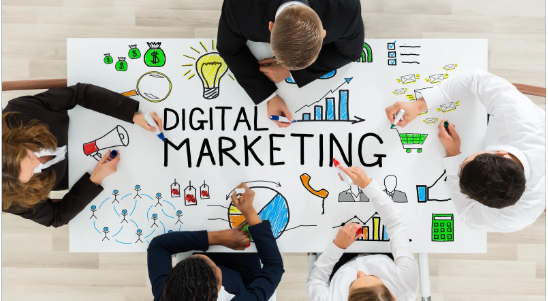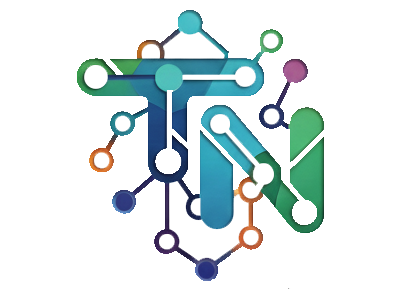
Introduction to Digital Marketing
What is Digital Marketing?
Digital marketing is the practice of using online channels to promote brands, attract customers, and drive sales. Unlike traditional marketing, it provides measurable results and a wider reach at a lower cost.
The Evolution of Digital Marketing
Over the years, digital marketing has integrated AI, automation, and data-driven strategies to improve campaign effectiveness.
Key Components of Digital Marketing
Search Engine Optimization (SEO)
SEO is the process of optimizing websites to rank higher in search engine results, such as Google, Yahoo, or Bing. By improving on-page and off-page factors—like keyword optimization, technical SEO, content creation, and backlink strategies—SEO helps businesses enhance their organic traffic and online visibility. Effective SEO increases the chances of reaching potential customers who are actively searching for related products or services, making it a vital component for long-term online success.
Pay-Per-Click Advertising (PPC)
PPC is a paid advertising model where businesses bid on specific keywords to have their ads appear on search engine results or social media platforms. Every time someone clicks on the ad, the business pays a fee. This strategy can deliver immediate results by driving targeted traffic to your website. By strategically targeting high-intent keywords and optimizing ad campaigns, businesses can see a positive ROI quickly, making PPC an essential tool for short-term and highly competitive digital marketing efforts.
Social Media Marketing (SMM)
Social media marketing revolves around promoting content, engaging with users, and building relationships on social platforms like Facebook, Instagram, LinkedIn, Twitter, and TikTok. Through organic posts and paid ads, SMM helps businesses connect with their audience, increase brand awareness, and drive traffic to their website. Social media is also a platform where brands can engage in two-way communication with their customers, helping foster community and loyalty.
Content Marketing
Content marketing is the strategic approach to creating and distributing valuable, relevant, and consistent content to attract and retain a clearly defined audience. This includes blogs, videos, podcasts, infographics, eBooks, and more. The goal of content marketing is to educate, inform, and entertain your audience while driving them through the sales funnel. With well-crafted content, businesses can position themselves as industry leaders, build trust, and drive conversions.
Email Marketing
Email marketing remains one of the most effective ways to nurture leads and convert them into paying customers. By sending personalized and targeted emails to subscribers, businesses can deliver valuable offers, promotions, newsletters, and updates directly to the inbox. Segmenting email lists and analyzing open rates, click-through rates, and conversions help refine email strategies for improved performance and customer retention.
Affiliate Marketing
Affiliate marketing is a performance-based strategy where businesses partner with individuals or other companies (affiliates) to promote their products or services. Affiliates earn a commission for every sale or lead generated through their unique referral link. This is a cost-effective way to expand reach and gain access to new audiences, as affiliates use their platforms—such as blogs, websites, or social media—to generate traffic and sales.
Influencer Marketing
Influencer marketing leverages individuals with large followings on platforms like Instagram, YouTube, and TikTok to promote products or services. Influencers have the power to shape consumer behavior and drive brand awareness by endorsing products in a more authentic and relatable manner. Brands can partner with influencers whose values align with their own to increase trust and expand their reach to a broader audience, ultimately enhancing brand credibility and sales.
Online Reputation Management
Online Reputation Management (ORM) focuses on maintaining and improving a brand’s image on the internet. This involves monitoring and responding to customer reviews, feedback, and social media mentions, as well as implementing public relations strategies to mitigate negative content. ORM aims to create a positive online presence that enhances customer trust and loyalty, ultimately influencing buying decisions and safeguarding the brand’s reputation in the digital landscape.
Benefits of Digital Marketing
Cost-Effectiveness
Digital campaigns cost less than traditional advertising methods while yielding higher returns.
Global Reach
Businesses can target customers worldwide without geographic limitations.
Data-Driven Decision Making
Advanced analytics help track campaign performance and refine marketing strategies.
Higher Customer Engagement
Social media and personalized email campaigns create stronger customer relationships.
Improved Conversion Rates
Optimized digital marketing strategies lead to better lead generation and conversions.
Digital Marketing Strategies for 2025
AI and Automation
AI enhances personalization and automates marketing tasks for efficiency.
Personalized Marketing
Businesses must create tailored experiences for better customer engagement.
Voice Search Optimization
With voice assistants gaining popularity, optimizing for voice search is crucial.
Video Marketing
Short-form and long-form video content continue to dominate digital marketing.
Influencer Collaborations
Both micro and macro influencers help brands expand their reach and credibility.
Omnichannel Marketing
A seamless marketing strategy across multiple channels enhances the customer journey.
Understanding SEO: The Backbone of Digital Marketing
On-Page SEO
On-page SEO focuses on optimizing elements within your website to improve search rankings. This includes refining website content, using relevant keywords, and optimizing meta tags like title tags and meta descriptions. It also involves ensuring proper use of header tags (H1, H2, etc.), improving user experience with readable content, and optimizing images with alt text. A strong on-page SEO strategy makes it easier for both users and search engines to understand your content, ultimately helping you achieve higher rankings and increased traffic.
Off-Page SEO
Off-page SEO refers to tactics performed outside of your website to improve search engine rankings. The most important strategy is acquiring high-quality backlinks from reputable sites, which boost your website’s trust and authority. Other off-page techniques include social media engagement, brand mentions, and influencer partnerships. Effective off-page SEO helps establish your website as a trusted resource and improves domain authority, which is crucial for better search engine visibility.
Technical SEO
Technical SEO ensures that your website is optimized for search engine crawlers and provides a seamless user experience. It includes improving website speed, ensuring mobile responsiveness, and fixing technical issues like broken links or duplicate content. Additionally, implementing structured data and HTTPS security helps enhance site performance. A technically optimized website not only ranks higher but also keeps visitors engaged, reducing bounce rates and encouraging longer visits.
The Power of Social Media Marketing
Choosing the Right Platform
To maximize the effectiveness of your social media marketing efforts, it’s essential to choose the platforms where your target audience is most active. Different platforms attract different demographics. For example, Instagram and TikTok are ideal for reaching younger audiences with visually appealing content, while LinkedIn is more suited for B2B businesses looking to engage professionals. Analyzing your audience’s behavior and preferences will help you focus your efforts on the right platforms, ensuring your content reaches the people who matter most.
Paid vs. Organic Strategies
While organic engagement on social media builds long-term relationships with your audience, combining it with paid advertising strategies can significantly amplify your reach. Organic strategies, such as regular posts and community engagement, are great for building brand loyalty and trust. On the other hand, paid ads allow you to target specific demographics, increase visibility, and drive immediate results. A balanced approach—leveraging both organic and paid tactics—often delivers the best results by creating a sustainable presence and driving quicker, targeted traffic.
Trends for 2025
Social media trends are constantly evolving, and 2025 will see continued growth in several areas. Short-form videos, driven by platforms like TikTok and Instagram Reels, will remain a dominant form of content. Live streaming is also on the rise, offering real-time engagement and direct interaction with audiences. Interactive content, such as polls, quizzes, and AR filters, will continue to captivate users and drive engagement. Staying on top of these trends and incorporating them into your strategy will help you stay relevant and connect more effectively with your audience.
Pay-Per-Click Advertising: Driving Instant Traffic
Google Ads vs. Social Media Ads
Google Ads focus on search intent, while social media ads target interests and behaviors.
Best Practices for PPC
Effective keyword research, compelling ad copy, and audience targeting improve PPC results.
Retargeting and Remarketing
These strategies help re-engage visitors who previously interacted with a brand.
Content Marketing: Engaging and Educating Your Audience
Types of Content
Blogs, videos, infographics, and podcasts enhance brand engagement.
Storytelling in Marketing
Compelling narratives create emotional connections with customers.
Content Trends for 2025
User-generated and interactive content will play a major role in marketing strategies.
Email Marketing: The Most Effective ROI Strategy
Personalization in Emails
Using customer data to create personalized email campaigns increases engagement.
Building an Email List
Lead magnets like free resources encourage more sign-ups.
Email Campaign Best Practices
A/B testing subject lines and mobile optimization improve open rates.
Measuring Digital Marketing Success
Key Performance Indicators (KPIs)
- Website Traffic
- Conversion Rates
- Social Media Engagement
Tools for Analysis
Google Analytics, SEMrush, and HubSpot provide insights into digital marketing performance.
Digital Marketing Challenges & How to Overcome Them
Increasing Competition
Creating unique value propositions helps brands stand out.
Ad Fatigue
Rotating ad creatives and using different formats keep campaigns fresh.
Privacy Concerns
Compliance with GDPR and data protection laws is essential for ethical marketing.
Future of Digital Marketing
AI, AR, and VR
Emerging technologies like Artificial Intelligence (AI), Augmented Reality (AR), and Virtual Reality (VR) are poised to reshape digital marketing by providing more personalized and immersive customer experiences. AI will enable marketers to leverage automation, chatbots, predictive analytics, and personalized content creation, improving efficiency and targeting. Meanwhile, AR and VR will provide interactive experiences, allowing consumers to virtually try products or engage in immersive brand experiences. These technologies not only enhance customer engagement but also increase conversion rates by offering a deeper connection with products or services, ultimately transforming how brands interact with their audiences.
Blockchain in Marketing
Blockchain technology is revolutionizing digital marketing by providing transparency, security, and trust. Through its decentralized nature, blockchain eliminates ad fraud and improves data integrity, offering consumers more control over their personal information. In digital advertising, blockchain ensures more secure and transparent transactions, which fosters trust between brands and their customers. As the technology evolves, integrating blockchain into marketing strategies will create more accountability, reduce fraud, and increase consumer confidence in digital ads, helping marketers build stronger, more transparent relationships with their audience.
Web 3.0 and Decentralization
Web 3.0 represents the next phase of the internet, characterized by decentralization and enhanced privacy. In this new landscape, consumers will have greater control over their data, which will fundamentally alter digital marketing strategies. Marketers will need to adapt by focusing on creating value-driven, trust-based experiences that respect user privacy. Decentralized platforms will empower individuals and reduce the control of major tech giants over online spaces. As Web 3.0 continues to grow, marketers will need to embrace new tools and approaches to reach consumers in ways that align with these changes, shifting away from traditional models of online advertising.
Why Choose Tech Nodes Solutions for Digital Marketing?
Industry Expertise
At Tech Nodes Solutions, we pride ourselves on staying ahead of the curve in the ever-evolving digital marketing landscape. Founded in 2015, we have a deep understanding of the latest trends and innovations in digital marketing. Our team continuously updates our knowledge base to implement cutting-edge strategies that give our clients a competitive edge. Whether it’s SEO, PPC, or social media marketing, our expertise ensures your business stays relevant and visible in a crowded digital space.
Customized Strategies
We believe that every business is unique, and so should be its digital marketing strategy. Since our inception, we have been dedicated to crafting tailored marketing plans that align with your specific business goals. By thoroughly understanding your brand, audience, and objectives, we create a roadmap that drives results. Whether you’re looking to increase brand awareness, drive sales, or boost online engagement, Tech Nodes Solutions delivers customized solutions that cater to your needs, ensuring long-term success.
Transparent Reporting
We understand that data-driven decisions are key to success. That’s why at Tech Nodes Solutions, we provide transparent and detailed analytics to help you track the performance of your digital marketing campaigns. Our comprehensive reports cover key metrics such as ROI, conversion rates, traffic sources, and more, giving you a clear picture of your marketing efforts. With over 100 successful global projects delivered, our team’s focus on measurable results and accountability ensures that every campaign is optimized for maximum impact.
Get Started with Tech Nodes Solutions Today!
Ready to take your business to the next level with expert digital marketing strategies? Contact Tech Nodes Solutions today for a free consultation and let us help you achieve your goals!
Get in Touch with Tech Nodes Solutions
At Tech Nodes Solutions, we specialize in delivering cutting-edge custom software solutions tailored to your unique business needs. Whether you need scalable enterprise software or a specialized application, our team is ready to bring your vision to life.
Contact us today and take your business to the next level!




